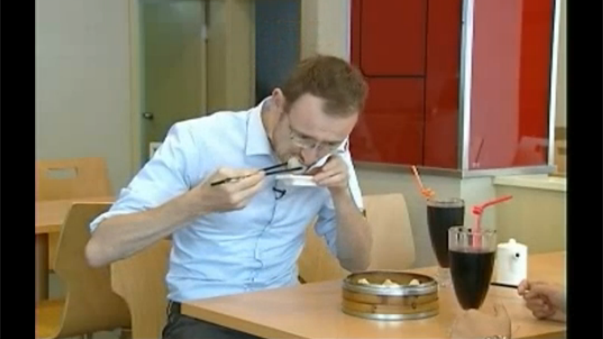
Click here to get a hard copy of this book
课文一
小李和小林聊天气和身体情况。你的鼻子怎么流血了?快用纸擦擦。我还不习惯北方的气候,估计是天气太干。今天天气不是很冷,你怎么穿这么多?就是因为昨天穿得太少,我都感冒了。最近感冒的人特别多。你去看医生了吗?没有,我只是咳嗽,有点儿头疼,不严重,多喝点儿水就好了。春天天气时冷时热,特别容易感冒。这时候一定要多注意保暖,另外,最好经常打开窗户换换空气。
生词 流血 擦 气候 估计 咳嗽 严重 窗户 空气
Xiaoxia and Xiaoyu talk about Xiaoyu's smoking
Xiaoxia: Is your cough better? What did the doctor say?
Xiaoyu: The same as before, he told me not to smoke anymore.
Xiaoxia: Smoking is not good for your health at all.
Xiaoyu: I know also, but I think smoking looks very handsome.
Xiaoxia: When problems start to appear in your body, then it will be too late to regret.
Xiaoyu: Actually, my family has always opposed me smoking, but I think it doesn't matter. But recently I always cough, so I am a little worried.
Xiaoxia: Smoking is not only bad for you, but also affects the health of people around you. For you and your family, don't smoke again.
聊: liáo: to chat
抽烟: chōuyān: to smoke (a cigarette, tobacco)
事情: shìqing: affair / matter
咳嗽: késou: to cough
老样子: lǎoyàngzi: old situation
以后: yǐhòu: afterwards / in the future
身体: shēntǐ: one's health
好处: hǎochu: benefit
可是: kěshì: but / however / (used for emphasis) indeed
动作: dòngzuò: action / motion
看上去: kànshangqu: it would appear / it seems
帅: shuài: smart / cool! / sweet!
出现: chūxiàn: to appear / to arise
后悔: hòuhuǐ: to regret / to repent
来不及: láibují: there's not enough time (to do sth)
其实: qíshí: actually / in fact / really
家人: jiārén: household / (one's) family
一直: yīzhí: continuously / always
反对: fǎnduì: to fight against / to oppose
却: què: but / yet / however
没什么: méishénme: it doesn't matter / never mind
最近: zuìjìn: recently / soon
担心: dānxīn: anxious / worried / uneasy
不仅: bùjǐn: not only
影响: yǐngxiǎng: effect / to affect
周围: zhōuwéi: surroundings / environment
健康: jiànkāng: health
为了: wèile: in order to / for the purpose of
抽: chōu: pump / to draw out
小夏和小雨聊小雨抽烟的事情
小夏:你咳嗽好点儿了吗? 医生怎么说的?
小雨:还是老样子,他让我以后不要再抽烟了。
小夏:抽烟对身体一点儿好处也没有。
小雨:我也知道,可是我觉得抽烟这个动作看上去很帅。
小夏:等你身体出现问题了,后悔就来不及了。
小雨:其实家人也一直反对我抽烟,我自己却觉得没什么。但最近总是咳嗽,所以我有些担心了。
小夏:抽烟不仅对自已没好处,还会影响周围人的身体健康。为了你和你的家人,别再抽了。
Xiǎoxià hé xiǎoyǔ liáo xiǎoyǔ chōuyān de shìqíng
xiǎoxià: Nǐ késòu hǎo diǎner le ma? Yīshēng zěnme shuō de?
Xiǎoyǔ: Háishì lǎo yàngzi, tā ràng wǒ yǐhòu bùyào zài chōuyān le.
Xiǎoxià: Chōuyān duì shēntǐ yīdiǎner hǎochù yě méiyǒu.
Xiǎoyǔ: Wǒ yě zhīdào, kěshì wǒ juédé chōuyān zhège dòngzuò kànshàngqù hěn shuài.
Xiǎoxià: Děng nǐ shēntǐ chūxiàn wèntí le, hòuhuǐ jiù láibují le.
Xiǎoyǔ: Qíshí jiārén yě yīzhí fǎnduì wǒ chōuyān, wǒ zìjǐ què juédé méishénme. Dàn zuìjìn zǒngshì késòu, suǒyǐ wǒ yǒuxiē dānxīnle.
Xiǎoxià: Chōuyān bùjǐn duì zìyǐ méi hǎochù, hái huì yǐngxiǎng zhōuwéi rén de shēntǐ jiànkāng. Wèile nǐ hé nǐ de jiārén, bié zài chōu le.
聊: liáo: to chat
影响: yǐngxiǎng: to influence / to affect
跳: tiào: to jump / to twitch
大夫: dàifu: doctor / physician
长: cháng: long / constantly
前面: qiánmiàn: in front
工作: gōngzuò: to work
最好: zuìhǎo: best
休息: xiūxi: rest / to rest
然后: ránhòu: afterwards
开始: kāishǐ: to begin / to start
这么: zhème: this way / like this
向: xiàng: towards
远处: yuǎnchù: distant place
尤其是: yóuqíshì: especially
绿色: lǜsè: green
植物: zhíwù: plant / vegetation
不仅: bùjǐn: not only
眼睛: yǎnjing: eye
舒服: shūfu: comfortable / feeling well
研究: yánjiū: research / a study
发现: fāxiàn: to find / to discover
静坐: jìngzuò: to sit quietly
超过: chāoguò: to surpass / to exceed
健康: jiànkāng: health
像: xiàng: to be like / such as
咱们: zánmen: we or us
久: jiǔ: (long) time / (long) duration of time
办公室: bàngōngshì: office
注意: zhùyì: to pay attention to
站起来: zhànqǐlai: to stand up
活动: huódòng: to exercise / to move
小李和小林聊电脑对身体的影响
小李:我最近眼睛总是跳,大夫说是因为我长时间看 电脑,眼睛太累。
小林:长时间坐在电脑前面工作,眼睛很容易累。最好是每过一小时就休息休息,然后再开始工作。
小李:医生也这么说,他还告诉我要多向远处看看, 尤其是多看看绿色的植物。
小林:长时间对着电脑不仅对眼睛不好,身体也会不 舒服。研究发现,如果人一天静坐超过6小时,就会 影响身体健康。
小李:是啊!像咱们这些久坐办公室的人要注意,有时间应该多站起来活动活动。
小林: 好,咱们午饭后就去附近的公园散散步吧。
Xiǎo lǐ hé xiǎolín liáo diànnǎo duì shēntǐ de yǐngxiǎng
xiǎo lǐ: Wǒ zuìjìn yǎnjīng zǒng shì tiào, dàfū shuō shì yīnwèi wǒ cháng shíjiān kàn diànnǎo, yǎnjīng tài lèi.
Xiǎolín: Cháng shíjiān zuò zài diànnǎo qiánmiàn gōngzuò, yǎnjīng hěn róngyì lèi. Zuì hǎo shì měiguò yī xiǎoshí jiù xiūxí xiūxí, ránhòu zài kāishǐ gōngzuò.
Xiǎo lǐ: Yīshēng yě zhème shuō, tā hái gàosù wǒ yào duō xiàng yuǎn chù kàn kàn, yóuqí shì duō kàn kàn lǜsè de zhíwù.
Xiǎolín: Cháng shíjiān duìzhe diànnǎo bùjǐn duì yǎnjīng bù hǎo, shēntǐ yě huì bù shūfú. Yánjiū fāxiàn, rúguǒ rén yītiān jìngzuò chāoguò 6 xiǎoshí, jiù huì yǐngxiǎng shēntǐ jiànkāng.
Xiǎo lǐ: Shì a! Xiàng zánmen zhèxiē jiǔ zuò bàngōngshì de rén yào zhùyì, yǒu shíjiān yīnggāi duō zhàn qǐlái huódòng huódòng.
Xiǎolín: Hǎo, zánmen wǔfàn hòu jiù qù fùjìn de gōngyuán sàn sànbù ba.
Xiao Li and Xiao Lin talk about the effects of computers on health
Xiao Li: Recently my eyes have always been twitching. The doctor said it was because my eyes were too tired after watching the computer for a long time.
Xiao Lin: Sitting in front of the computer for a long time and working makes my eyes tired easily. It is best to take a break after every hour and then start working again.
Xiao Li: The doctor said the same. He also told me to look far away, especially the green plants.
Xiao Lin: Long time facing the computer is not only bad for the eyes, but also uncomfortable for the health. Studies have found that if people sit still for more than 6 hours a day, it will affect their health.
Xiao Li: Yes! Those of us who sit in the office for a long time should be aware that we should stand up and do more activities when we have time.
Xiaolin: Okay, let's go for a walk in the nearby park after lunch.
希望: xīwàng: to wish for / to desire / hope
健康: jiànkāng: health / healthy
过去: guòqù: (in the) past
认为: rènwéi: to believe / to think
指: zhǐ: to point at or to / to indicate or refer to
生病: shēngbìng: to fall ill
精神: jīngshén: mind / mental
算是: suànshì: considered to be
真正: zhēnzhèng: genuine / real / true
位: wèi: classifier for people
教授: jiàoshòu: professor
数字: shùzì: numerals / digit / figure
说明: shuōmíng: to explain / to illustrate
多么: duōme: how (much etc)
要是: yàoshi: if
后面: hòumiàn: behind / afterwards
不管: bùguǎn: regardless of / no matter
没用: méiyòng: useless
平时: píngshí: ordinarily / in normal times
一定要: yīdìngyào: must
注意: zhùyì: to pay attention to
锻炼: duànliàn: to engage in physical exercise / to work out
出问题: chūwèntí: to have a problem arise
后悔: hòuhuǐ: to regret / to repent
每个人都希望自己健康,那么什么才是健康呢?过去,人们认为健康就是指身体不生病。但是,现在人们认识到,健康还指精神上的健康。只有身体和精神都健康,才算是真正的健康。有一位教授用数字来说明健康有多么重要:要是健康是1,其他都是1后面的0; 如果没有1, 不管有多少0也没用。所以我们平时一定要注意锻炼,别等健康出问题了才后悔。
Měi gèrén dōu xīwàng zìjǐ jiànkāng, nàme shénme cái shì jiànkāng ne? Guòqù, rénmen rènwéi jiànkāng jiùshì zhǐ shēntǐ bù shēngbìng. Dànshì, xiànzài rénmen rènshí dào, jiànkāng hái zhǐ jīngshén shàng de jiànkāng. Zhǐyǒu shēntǐ hé jīngshén dōu jiànkāng, cái suànshì zhēnzhèng de jiànkāng. Yǒuyī wèi jiàoshòu yòng shùzì lái shuōmíng jiànkāng yǒu duōme zhòngyào: Yàoshi jiànkāng shì 1, qítā dōu shì 1 hòumiàn de 0; rúguǒ méiyǒu 1, bùguǎn yǒu duōshǎo 0 yě méi yòng. Suǒyǐ wǒmen píngshí yīdìng yào zhùyì duànliàn, bié děng jiànkāng chū wèntíle cái hòuhuǐ.
Everyone wants to be healthy, so what is health? In the past, people thought that being healthy means not getting sick. However, people now realize that health also refers to mental health. Only when the body and mind are healthy can be regarded as true health. A professor used numbers to illustrate how important health is: if health is 1, everything else is 0 after 1 (e.g 1.000➯); and if there is no 1, no matter how many 0's (e.g 0.000➯) there are, it is useless. Therefore, we must always pay attention to exercise and do not wait for health problems to arise and regret afterward.
位: wèi: classifier for people
医生: yīshēng: doctor
一句话: yījùhuà: in a word / in short
最好: zuìhǎo: best
药: yào: medicine / drug
运动: yùndòng: sports / exercise
散步: sànbù: to go for a walk
条: tiáo: clause
理解: lǐjiě: to comprehend / to understand
深: shēn: deep / deeply
完全: wánquán: complete / whole
同意: tóngyì: to agree
生活: shēnghuó: life
锻炼: duànliàn: to engage in physical exercise / to work out
方法: fāngfǎ: method / way
既: jì: both
活动: huódòng: to move / to exercise
减肥: jiǎnféi: to lose weight
像: xiàng: to resemble / to be like
跑步: pǎobù: to run / to jog
辛苦: xīnkǔ: exhausting / hard / tough
一家人: yījiārén: household / the whole family
出去: chūqù: to go out
散散步: sànsànbù: to have a walk
件: jiàn: classifier for events, things etc
幸福: xìngfú: happy / blessed
肚子: dùzi: belly / abdomen / stomach
需要: xūyào: to need
交流: jiāoliú: communication / interaction
夫妻: fūqī: husband and wife / married couple
说说: shuōshuo: to say sth
一天: yītiān: a day
工作: gōngzuò: job / work
加深: jiāshēn: to deepen
感情: gǎnqíng: affection / feelings between two persons
谈谈: tántán: to discuss / to have a chat
学校: xuéxiào: school
有意思: yǒuyìsi: interesting / enjoyable
烦恼: fánnǎo: to be distressed / worries
跑掉: pǎodiào: to run away
我听一位医生说过一句话:“最好的医生是自己,最好的药是时间,最好的运动是散步。”前两条我理解得不深,最后一条我完全同意。散步是生活中最简单的锻炼方法,既可以活动身体,又可以减肥,而且不会像跑步那样辛苦。晚饭后,一家人一起出去散散步,是一件很幸福的事情。肚子吃饱了需要活动,家人忙了一天需要交流,夫妻说说一天的工作能加深感情,听孩子谈谈学校里有意思的事,一天的烦恼就都跑掉了
Wǒ tīng yī wèi yīshēng shuōguò yījù huà:“Zuì hǎo de yīshēng shì zìjǐ, zuì hǎo di yào shì shíjiān, zuì hǎo de yùndòng shì sànbù.” Qián liǎng tiáo wǒ lǐjiě dé bù shēn, zuìhòu yītiáo wǒ wánquán tóngyì. Sànbù shì shēnghuó zhōng zuì jiǎndān de duànliàn fāngfǎ, jì kěyǐ huódòng shēntǐ, yòu kěyǐ jiǎnféi, érqiě bù huì xiàng pǎobù nàyàng xīnkǔ. Wǎnfàn hòu, yījiārén yīqǐ chūqù sàn sànbù, shì yī jiàn hěn xìngfú de shìqíng. Dùzi chī bǎole xūyào huódòng, jiā rén mángle yītiān xūyào jiāoliú, fūqī shuō shuō yītiān de gōngzuò néng jiāshēn gǎnqíng, tīng háizi tán tán xuéxiào li yǒuyìsi de shì, yītiān de fánnǎo jiù dōu pǎodiào le
I heard a doctor say: "The best doctor is yourself, the best medicine is time, and the best exercise is walking." I don't understand the first two clauses deeply, and I completely agree with the last one. Walking is the easiest way to exercise in life. Both you can move your body and also lose weight, moreover it won't be as hard as running. After dinner, the whole family go out for a walk together, is a very happy thing. When you have a full stomach, you need activities; when family members are busy all day they need to communicate. Husband and wife talk about a day's work can deepen feelings, and listen to children talk about interesting things in school, can make troubles depart hurriedly.
Click here to get a hard copy of this book






